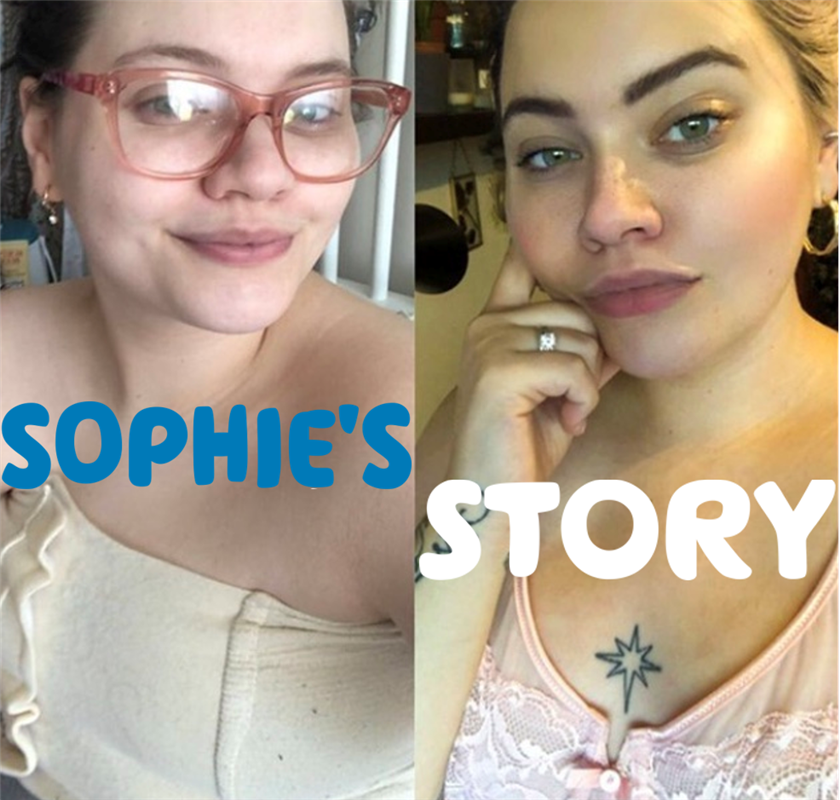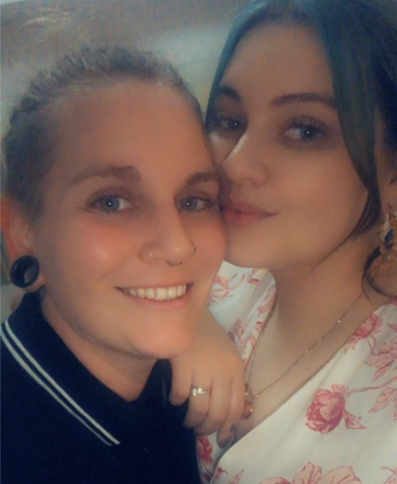
Image: Sophie (left) just after being discharged from hospital, and Sophie (right) 4 months after surgery.
Sophie found out that she had the BRCA2 gene mutation at 24, which increases the risks for certain cancers. Sophie opted to have a double mastectomy, as a preventative surgery. In her guest blog today, Sophie talks about her decision, navigating the healthcare system and finding support.
I’m Sophie, 28 years old, queer, pansexual and a BRCA2 gene carrier. Many of my family members have been affected by breast and ovarian cancer, and it was only when my dad was diagnosed with prostate cancer that I was advised to get genetic testing. That test came back positive.
I have the BRCA2 gene mutation. This means that my risk of breast and ovarian cancer is significantly higher than that of someone without the genetic mutation. Whilst cancer isn’t usually genetic or hereditary, some types of cancer like breast, ovarian and prostate cancer can be influenced by genes and can therefore run in families. That is certainly the case with my family, and why I would always urge someone who has a family history of cancer to check in with your GP and potentially be referred for testing.
“I was diagnosed at 24, and there are limited screening options for that age bracket”
I was diagnosed at 24, and there are limited screening options for that age bracket – mammograms do not work efficiently as my breast tissue is too dense. The only option I felt was truly preventative, was a double mastectomy. As soon as I had decided this, I was referred to QVH in East Grinstead and was placed on the waiting list for surgery. I had a bilateral double mastectomy with pre pectoral saline implants in March 2020.
“Navigating the healthcare system is a vastly different experience for those in the LGBT+ community.”
Navigating the healthcare system is a vastly different experience for those in the LGBT+ community. There are many challenges and difficulties that I faced during my hospital visits and appointments, and many times where I had to ‘out’ myself. I think one of the most important things we can all do, is use inclusive language when talking about cancer – it isn’t only women that get breast cancer. All genders can have ovaries or prostates. Whilst I understand language can be hard for some to understand – ultimately, we are creating safe spaces for all people regardless of gender identity or sexuality to feel safe during a scary and vulnerable time.
The NHS staff were incredible and are all clearly committed to learning to be the best allies possible – but my time in hospital left me with the impression that there is still much to do. I think the cancer experience for someone that is trans specifically, could be extremely difficult to circumnavigate and we all need to ensure that more support is available for trans and LGBT+ people.
I was lucky enough to find Live Through This, a charity that is dedicated to supporting members of the LGBT+ community that have been affected by cancer. They create safe spaces for all members to talk with others going through similar lived experiences, and have access to healthcare professionals. Live Through This allowed for me to feel I had some support, and understanding, I felt valid and seen, and truly felt like I could heal mentally in a safe and constructive place. Live Through This are a charity that so many LGBT+ should know about and truly offer incredible support.
“I felt valid and seen, and truly felt like I could heal mentally in a safe and constructive place.”
I have since done work with CoppaFeel – another amazing charity that encourage people to check their chests and are making huge steps to ensure inclusivity across their charity and their social media presence. There is so much support available to us, I have mostly found this online in the form of posts on Instagram, and blog posts on the Macmillan website, as well as some community groups funded by QVH.

Image: Sophie (right) and her spouse
We’d like to thank Sophie for sharing her story with us. If you can relate to Sophie’s story, why not share your experience in the comments below? You can find support and resources on Live Through This’s website, alongside the support available here on the Online Community.
Read more from Sophie:
Being bodies - Sophie, body confidence and her double mastectomy
Whatever cancer throws your way, we’re right there with you.
We’re here to provide physical, financial and emotional support.
© Macmillan Cancer Support 2026 © Macmillan Cancer Support, registered charity in England and Wales (261017), Scotland (SC039907) and the Isle of Man (604). Also operating in Northern Ireland. A company limited by guarantee, registered in England and Wales company number 2400969. Isle of Man company number 4694F. Registered office: 3rd Floor, Bronze Building, The Forge, 105 Sumner Street, London, SE1 9HZ. VAT no: 668265007